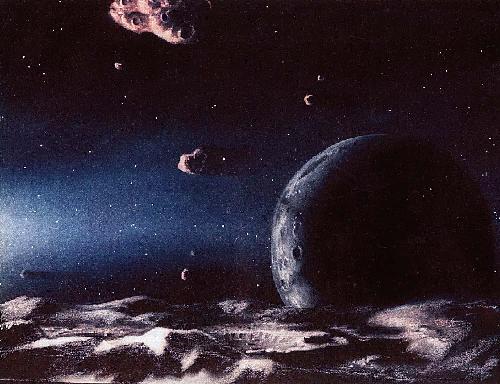
Kuiper Belt Books
Beyond Pluto by John Davies
Non-technical (2001).
Getting a little old, this remains an excellent single-author
description of observational work on the Outer Solar System. I especially
like the way it shows how, at any one moment, nobody knows what's
happening, although after the fact they pretend that they do. An
excellent read for anyone casually interested in astronomy.
The Pluto Files by Neil deGrasse Tyson
Non-technical (2009).
Framed around the Pluto is/is not a planet debate,
for public consumption (astronomers don't care). The author is
a science popularizer who knows the subject and can write well, a rare
combination. One day I'll ask him what's with the 'deGrasse'.
Oh, OK. You ask him. I don't really care.
Saas Fee 35: Trans-Neptunian Objects and Comets
Technical (2008).
The Swiss finance an annual meeting and book in a series named after
the town where the meeting was once (but is not now) usually held.
Still well known in astronomy, the Saas Fee series has had almost no
representation of the Solar system. Until now. The special feature is
the 'tutorial style', which means that the writers are asked to aim at
coherent, self-contained presentations of the material in a style of
use to graduate students.
Small Bodies in Planetary Systems (Lecture Notes in Physics)
Technical (2008).
Organized in a Saas-Fee like style, but as a series of Solar system
topics organized in Japan by Ingrid Mann and colleagues. I like this
book. Good for graduate students because the book is well written and
the chapters stick pretty close to the tutorial style.
The Solar System Beyond Neptune
Technical (2008).
University of Arizona's planetary science series. These books
are massive blocks of literature, encylopedic in nature but
lacking the tutorial style of the previous two books. Like an
encylopedia, you'll go into this one for the occasional foray, but
you can't read it as a book, there's just too much material
and detail.
At the Edge of the Solar System
Non-Technical (2009).
This book first appeared in French and, although it looked pretty,
I couldn't read it. Now translated into English, I want to say that
this is a really terrific book about the Kuiper belt. Not only
are the figures in color and well done, but the text is clear and the
writers relate the excitement of the subject. No equations, just
results and ideas. A great book for the interested non-specialist.
The Trans-Neptunian Solar System
Technical (2020).
Short chapters from a meeting held in Portugal in 2019. This is a lively technical
book and, if you are a grad student, probably the best way to get a feel for what is happening in Kuiper
belt research at the start of the '20s.
The Pluto System After New Horizons Technical (2021).
An exhaustive (and exhausting) set of review papers focused on Pluto and results from New Horizons but with some contextual chapters on the broader Kuiper belt. If anything, the book is far too long for its scientific content; at some point, the editors should have enforced the difference between a refereed scientific article and a review, but they didn't. For the afficionado, only.
 Kuiper Belt
Kuiper Belt
